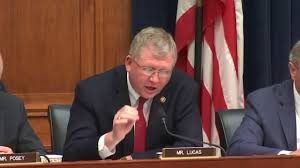
Congressman Frank Lucas (OK-03) signed a letter, joining 129 of his House Republican colleagues, supporting the Council on Environmental Quality’s (CEQ) efforts to modernize the National Environmental Policy Act (NEPA).
“In our districts across the country, we constantly hear about the opportunities lost when projects are stalled by NEPA’s increasingly time consuming and unnecessary red tape,” the letter reads. “As we travel throughout our communities, we experience these failures as we encounter crumbling roads and closed-off bridges that may wait years for repair. We all want better roads, stronger bridges, and improved infrastructure, but without NEPA reform that reality is years away.”
The letter highlights how NEPA has delayed countless energy and infrastructure projects across the country with unnecessary regulations. Spearheaded by Congressman Steve Scalise (LA-01) and Congressman Dan Newhouse (WA-04), the letter encourages and supports the Trump Administration’s efforts to streamline and modernize the NEPA in order to encourage environmental leadership while eliminating the negative effects of permitting delays for critical infrastructure projects in communities across the United States.
The full letter can be found below.
Chairman Neumayr:
We write in support of the Council on Environmental Quality’s (CEQ) efforts to modernize the National Environmental Policy Act (NEPA). This rulemaking represents the first comprehensive overhaul since the NEPA regulations were originally promulgated more than 40 years ago. These critical reforms will bring needed clarity to our nation’s environmental laws, preserve the competitive edge that powers our economy, and foster continued stewardship of our environment and natural resources.
Congress wrote NEPA with the straightforward, significant goal of establishing a review framework “under which man and nature can exist in productive harmony, and fulfill the social, economic, and other requirements of present and future generations of Americans.” However, over the years, through misguided regulation, and presidential directive, the NEPA process has strayed from these objectives. Now, unending litigation and mountains of paperwork define a permitting process that stretches along an indefinite timeline.
According to CEQ, preparation of an Environmental Impact Statement (EIS) takes an average of four and a half years to complete, while a quarter are not finished within six years. These timelines are further exacerbated by the fact that many are not completed until after state and local environmental reviews are completed. The average EIS length, which CEQ recommends remain below 150 pages, stretches beyond 600 pages. CEQ’s proposed rulemaking would ease this uncertainty through greater coordination among agencies and a more efficient review process.
In our districts across the country, we constantly hear about the opportunities lost when projects are stalled by NEPA’s increasingly time consuming and unnecessary red tape. As we travel throughout our communities, we experience these failures firsthand as we encounter crumbling roads and closed-off bridges that may wait years for repair. We all want better roads, stronger bridges, and improved infrastructure, but without NEPA reform that reality is years away.
NEPA modernization will benefit more than just transportation. Since 2009, the United States has been the world’s largest producer of natural gas. American households and manufacturers rely on this widely available, affordable fuel source that has made the U.S. the world leader in reducing carbon emissions. The rest of the world relies on it as well, with U.S. LNG exports now reaching more than 30 countries. However, critical pipeline construction is often stalled or blocked, in part, by the uncertainty of the NEPA process.
Moreover, delays slow innovation and plague development of emerging technologies. Off-shore and land-based wind energy projects face considerable delays and increased costs. Our aging electric grid needs updating to ensure reliability to connect these power sources with distant consumers. The inability to move projects forward also places U.S. national security at risk because our country has become entirely dependent on other countries for supplies of rare earth minerals, such as copper, zinc, lithium and cobalt, that are essential for clean energy deployment, electric vehicles and consumer electronics.
Permitting delays also hinder efforts to protect the environment and create more resilient communities. Expediting the permitting process would allow coastal restoration and flood protection projects to be finished in a timely fashion. It also promotes development of smarter and more sustainable forest management and agricultural practices. This rulemaking encourages responsible natural resource management, conservation, and recreation on our public lands and will benefit the environment and rural economies across the country.
Despite the misinformation being spread about CEQ’s proposal, this update to NEPA is entirely compatible with environmental stewardship. The proposed rule does not impact the existing requirements of the Clean Air Act, the Clean Water Act, and the Endangered Species Act. CEQ’s proposal simply avoids duplicative reviews while increasing clarity and transparency to the public, federal agency partners, and project developers on the process and timelines to the benefit of the economy and the environment.
These long overdue reforms are necessary to maintain our nation’s competitive edge while preserving our long history of environmental leadership. We encourage CEQ to finalize the rulemaking process under its current timeline and return the implementation of NEPA to its core procedural and informational purposes.
In January, the Council on Environmental Quality (CEQ) issued a Notice of Proposed Rulemaking to modernize and clarify the regulations of NEPA to facilitate a more efficient, effective, and timely NEPA review process. CEQ has not comprehensively updated its regulations since their promulgation in 1978, more than four decades ago.
The proposed amendments in this rulemaking would advance the original goals of CEQ regulations to reduce paperwork and delays of implementations of the policies set forth in NEPA.
Source: Press release from Rep. Lucas



